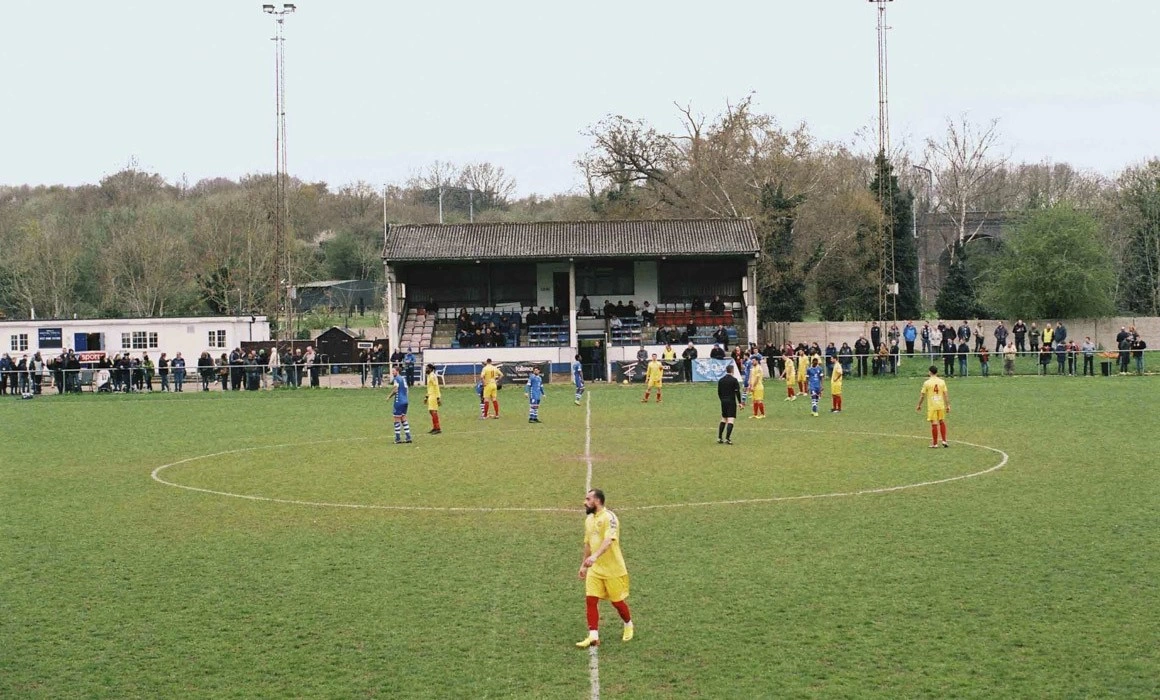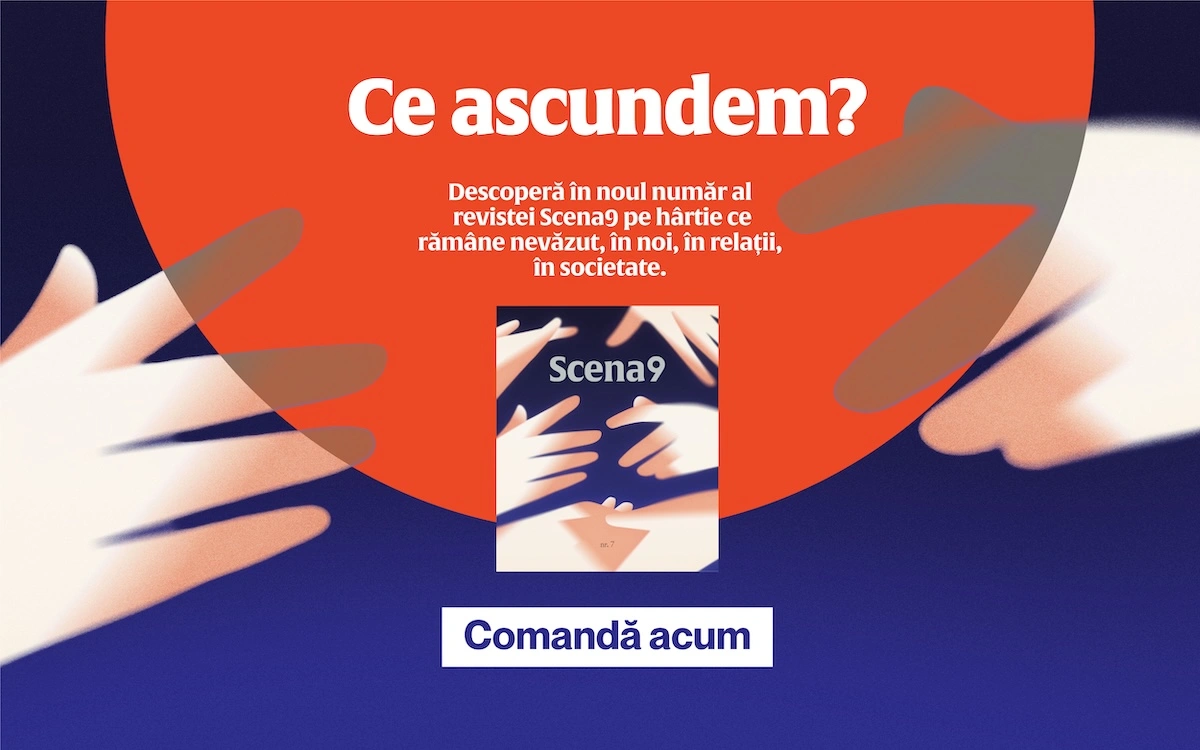‘Do you know anything about football?’, asks Ionuț Vintilă, the manager of the Romanian Football Club, before their game. ‘Yes... I’ve got my brother, my dad… I’ve seen some football in my life’, I mumble tentatively. It’s early April, a Saturday and the weather is uncertain. For the past two hours, I have been staring at my phone maps, attempting to make my way to FC Romania's away game. Children getting piggyback rides, young families, groups of men of all ages, are heading towards the football pitch in Hertford, an idyllic town about 30km away from London. At the entrance, I realize I don’t have any cash, but an amiable English FC Herford supporter offers to cover my ticket cost and, in true sportsmanship style, I promise I’ll one day return the favor.
I immediately recognize Ionuț, the founder of FC Romania. I know him from his Facebook profile, but also from his interviews for the BBC, Vice and The Times. The team was formed in 2006 by Romanian immigrants in the UK who had played at various football clubs in their home country. Now, the majority of the players and manager Ionuț work on construction sites in London, and, on Saturdays, they play at a semi-professional level in English football's 8th league.
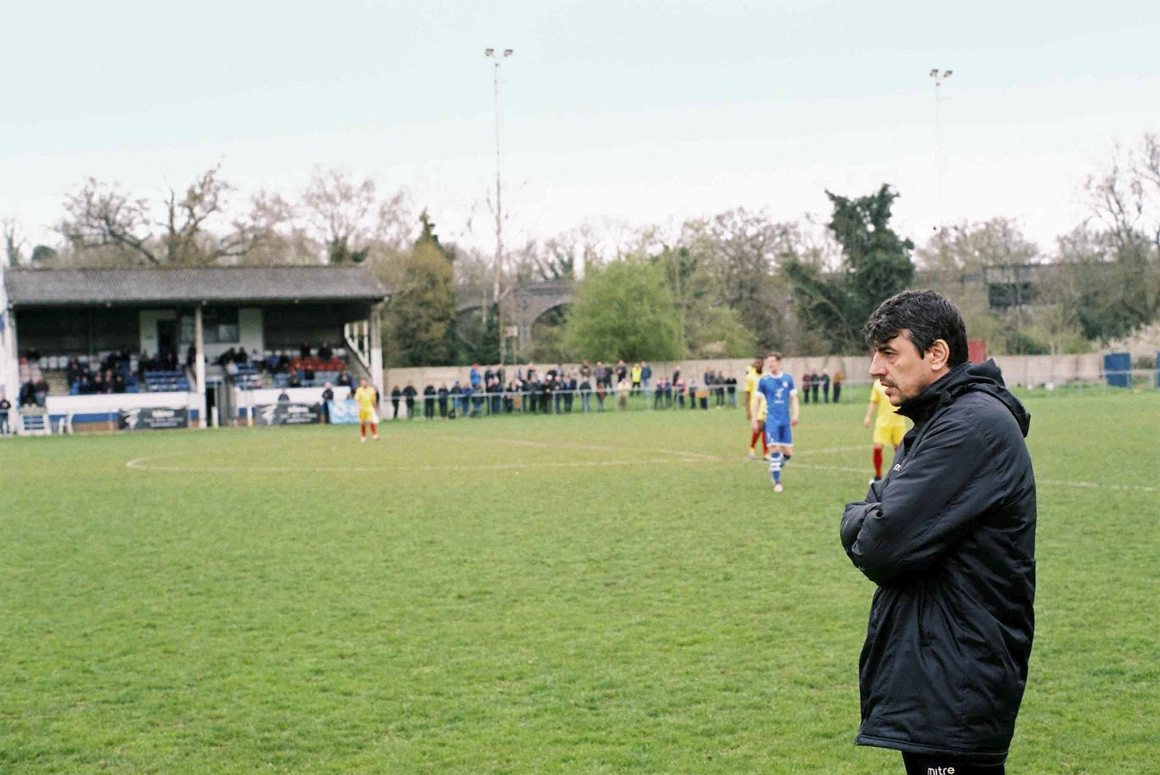
Ionuț is a man of around 40 years old and has a gentle expression, while his greyish hair and the dark circles under his eyes give him an assertive manner. He seems nervous before the game. I suggest an interview at the end of the match, but he warns he might get angry and irrational if they lose. There are another 5 games this season which will decide whether the team maintains its presence in English football's 8th league. After a second’s silence, he gives me a slight smile and directs me towards FC Romania’s supporters. From a distance, I spot a few fans wearing scarves emblazoned with the Romanian flag.
As I approach the crowd of about 10 people, I introduce myself to Rosie and Chris, a British couple in their thirties. Chris used to work on a construction site with some of FC Romania’s football players and started going to their games. For more than 5 years, the couple has spent every Saturday morning watching FC Romania play. In front of the small group of supporters is Florin Niculae, a man in his fifties, who plays the drum for the team. Before the 1989 Revolution in Romania, he used to be a percussionist for the House of the Communist Pioneers in Târgoviște, where Ionuț is also from. He becomes quiet and shy when I congratulate him on his rhythmic precision but his drum resonates so loud that the Romanian chants overshadow the much bigger group of FC Hertford supporters. In between cheering in Romanian ‘Go on, Wolves’, ‘Ro-ma-ni-a’, I can also discern less refined phrases referring to the opponents’ mothers. Rosie and Chris seem to have got the hang of these Romanian chants too.
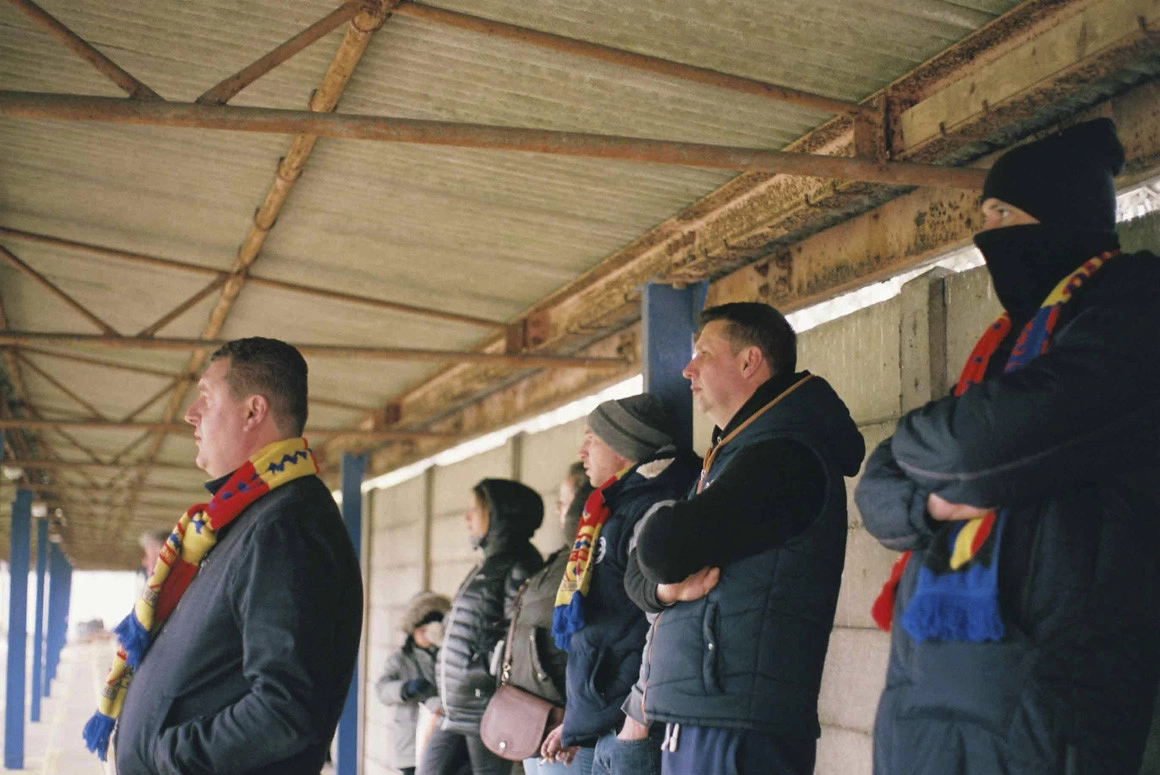
Hertford has several opportunities to score but miss even from a penalty. The Romanian team, despite playing an away game, manage to score their first goal through Gabrial Ghinea, by successfully taking advantage of a penalty kick. Tension grows and I distinguish some scattered ‘Brexit’ chants from the Hertford supporters' corner. A moderate verbal conflict ensues between ‘their Brits’ and ‘our Brits’ but the Romanian supporters get involved and calm down the situation quickly. Finally, FC Romania scores a second time through British player Roddy Lemba and the game is heading towards a surprisingly favorable ending for the Romanian team.
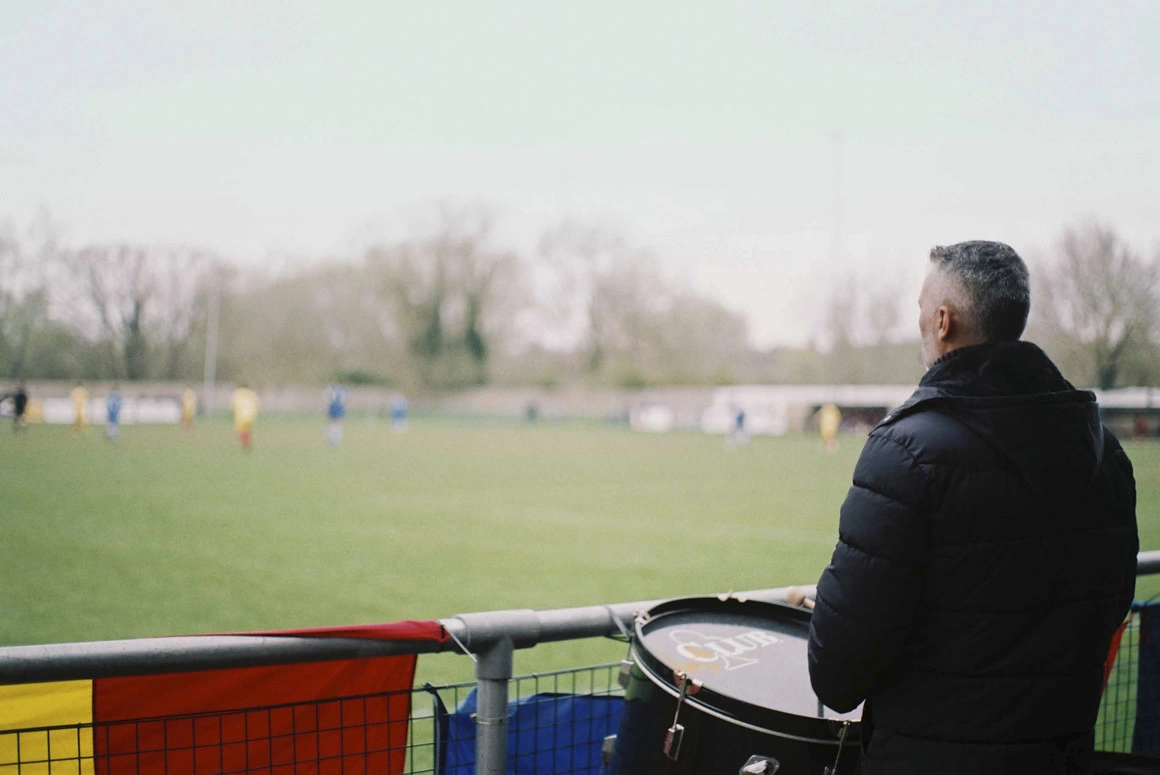
The FC Romania crowd introduce me to the elderly British fans John and Barbara Saunders, as well as John Adams, all three avid supporters. John Adams is the most animated, wearing a suit accessorized with the FC Romania logo and a scarf patterned with the Romanian flag. John Adams is in his seventies but lives the game with an ultras fan intensity. As I start inquiring about his connection to FC Romania, John Adams mentions that he is a member of the UKIP party and that he voted for Brexit. UKIP is a far-right leaning Eurosceptic party in the United Kingdom. Until 2016, it was led by Nigel Farage who has ignited many controversies through his claims regarding immigrants in general, and Romanian citizens in the UK. For example, he once affirmed that he would be worried if he had Romanian neighbors. Today, official statistics show that there are about 400,000 Romanians living in the UK. We surpass the number of Indian immigrants but are outnumbered by the Poles, who represent the largest non-British nationality living in the UK at the moment.
Our conversation is interrupted by the final whistle. The FC Romania players rush cheerfully towards their supporters. In the general excitement, John Adams kisses the Black British player Roddy Lemba and utters that he loves him when he scores.
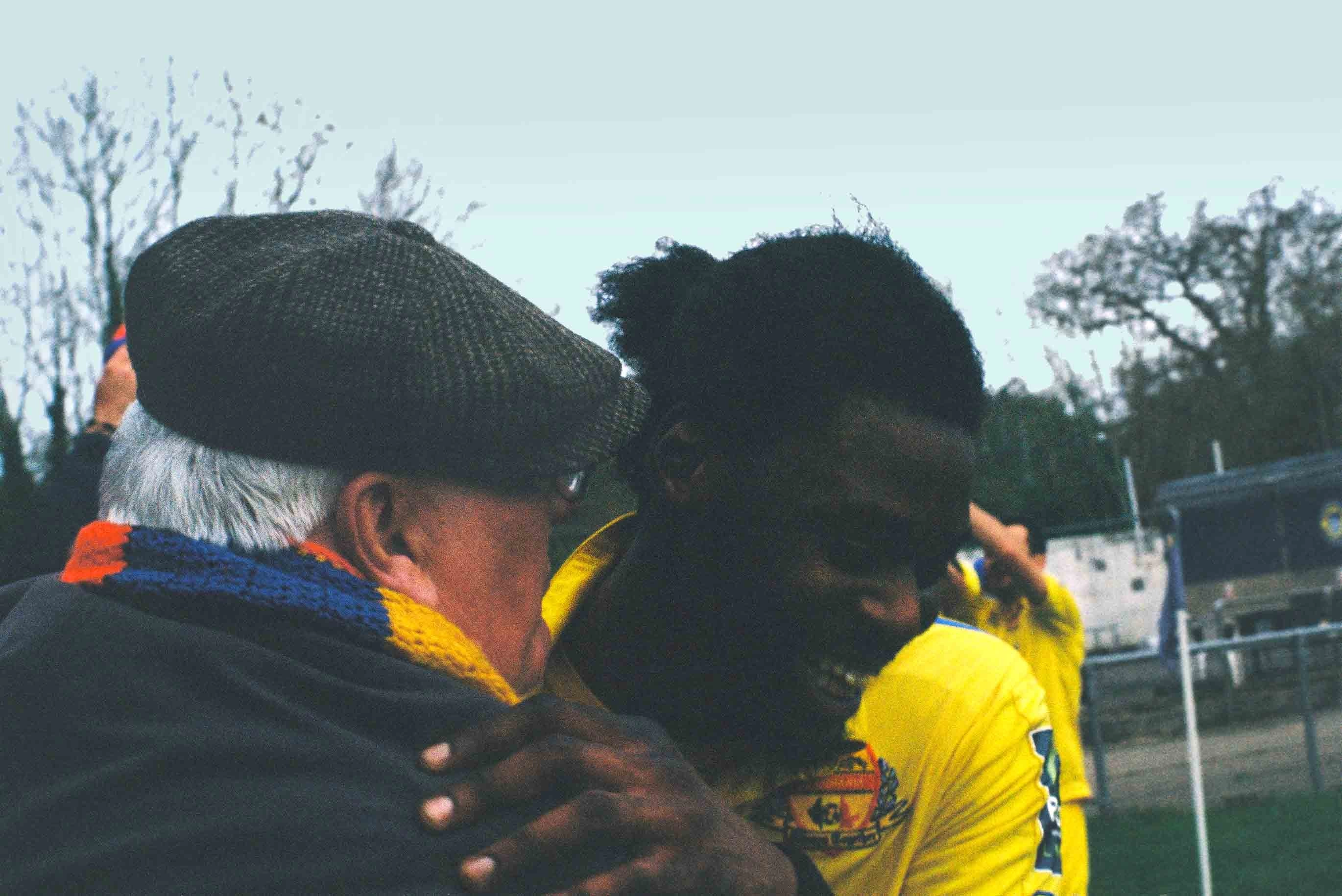
We carry on the discussion at the celebratory barbecue thrown by Alex, FC Romania board member, at his home in North West London. ‘That is my politics, this is my sport’, asserts John Adams, explaining to me what it’s like to be pro-Brexit and pro-FC Romania at the same time. I ask him why he confronted the supporters of Hertford FC who had chanted ‘Brexit’. He explains that sometimes he is ashamed by some of his fellow countrymen, who would require some education in certain areas. John feels he has learned a lot about immigrants and Romania during the time spent with the players of FC Romania. In 2012, John Adams was frequently attending the games of FC Cheshunt, on the same pitch that FC Romania has rented out over the past 7 years for their home games. In time, John got to know the Romanian footballers closely - as people and sportsmen - and is presently in charge of the microphone announcements at their games.
I am sat next to Sergiu Maximov, who plays the Joker role, as John Adams explains, given his ability to cover almost any position. At 30, Sergiu is bursting with energy, runs around and makes everyone laugh. He mentions that he is from Moldova, where his family owns the vineyard Orhei Wine. His brother, he carries on eagerly, is Alexandru Maximov, who was the top scorer in Moldova in 2011 and even played in Kazakhstan, ‘where there is money’, he adds earnestly. Sergiu played football in Moldova at Zimbru and Dacia Chișinău. In 2016, he moved to England to play at AFC Rushden & Diamonds, having been recommended to the team by a friend. However, Sergiu felt he wanted to move to a big city, like London. He had heard of Ionuț’s team and soon after contacting him, he transferred to FC Romania. Since then, Sergiu Maximov has been committed to football while also working in a construction storage facility.
Sergiu perfectly imitates John Adams and his sometimes Scottish accent, by often repeating: ‘FC Romeeenia - I lav it’. One can tell John is fond of the boys. I allude to the fact that Brexit could affect the future of the football players living in England and John quickly retorts that he doesn’t have anything against honest people who pay their taxes. When I suggest that some of the boys might have to return to Romania because of the UK leaving the EU, John answers that he would sincerely miss them.
At the barbeque, we listen to Romanian folk music. After a couple of pints, John Adams initiates a bold attempt at a Romanian traditional dance. The football players who have children leave the party early. The rest of us wait for the ‘mici’ ( a traditional Romanian dish made out of grilled meat), while we drink wine spritzers made with Cotnari wine and Borsec sparkling water, all Romanian products provided by our host Alex from one of the many Romanian shops that have sprung up all over London in the past few years.
While the football players handle the ‘mici’, I get to spend time with Ionuț Vintilă. He is the manager and president of the club, designer of the weekly brochure and anything else that is required. A sort of Chuck Norris, jack of all trades, he laughs. The grave demeanor he displayed before the game quickly disappears and, through jokes and banter, Ionuț recounts the history of FC Romania. Back home, Ionuț was playing football for Târgoviște Chindia before he moved over to England in 2005, hoping for a better life for him and his family, like many other Romanians (since) then. In 2006 in London, over some pints, a few Romanian immigrants decided to get a football team going and pointed at Ionuț when deciding who the manager should be. The role came to him rather than the other way around. Now, Ionuț is about to get his Football Management Licence from UEFA, which is recognized all over the world, after 18 months of courses, match visits from the FA representatives and a project of over 70 pages about his coaching strategies for FC Romania.
Back in 2006, Ionuț registered the team for the Sunday league in London and they finished top of the league in their very first season. The Saturday league, differently from the Sunday one, allows teams to advance hierarchically. Since 2008, FC Romania has been active in the Saturday league and has been promoted gradually from league 17 to league 8. During season 2012-2013, the team was promoted to league 9, which allowed them to play, after a year, in the FA Cup, the oldest football competition in the world. In 6 years of participating in the FA Cup, FC Romania made it to the second round of qualifications three times, in 2013-2014, 2017-2018, 2018-2019 respectively. In May last year, the name of the team was displayed on the reputed Wembley stadium as a participant team in the FA Cup, even if the boys didn’t get to play there.
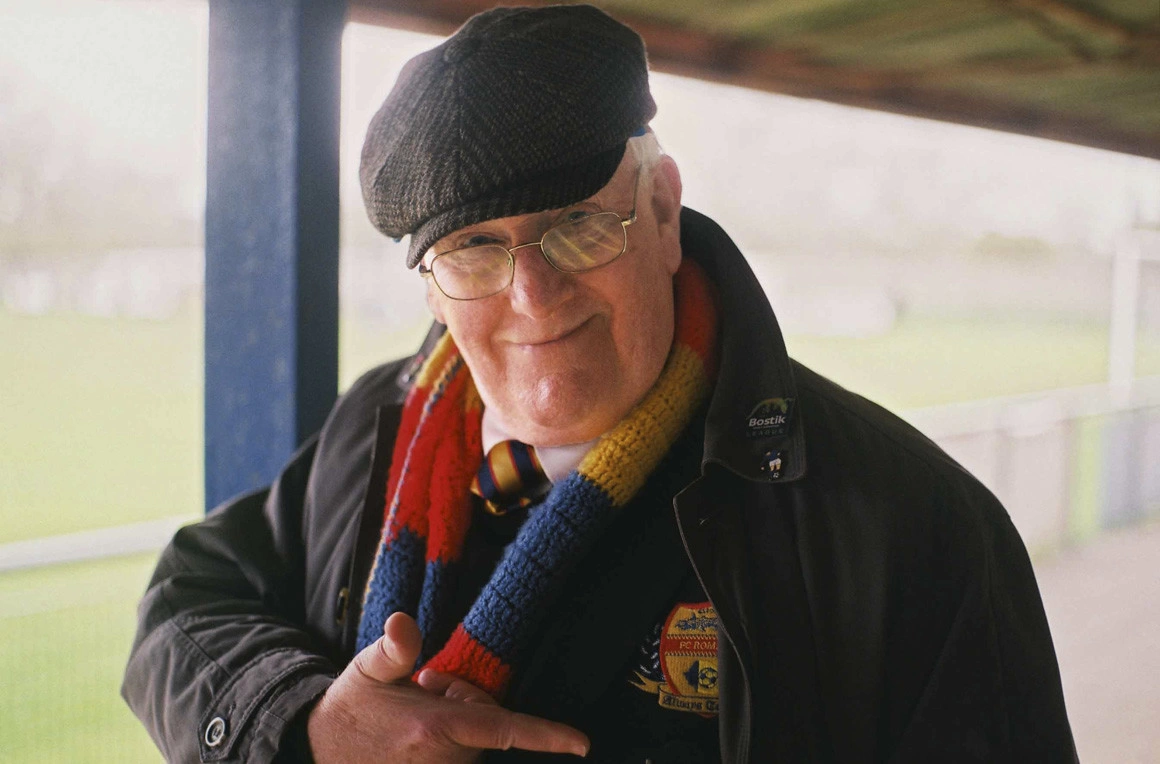
Ionuț and the other boys work on construction sites in different corners of London for five or six days a week. Many among them have left Romania in order to play for FC Romania, with the promise of a work contract from Ionuț or his contacts. The boys could work in construction on Saturdays too and would earn a lot more money than the games pay. Moreover, many of the football players have young families and small children. Ionuț doesn’t feel it is right to ask them to show up every Saturday and to also attend training.
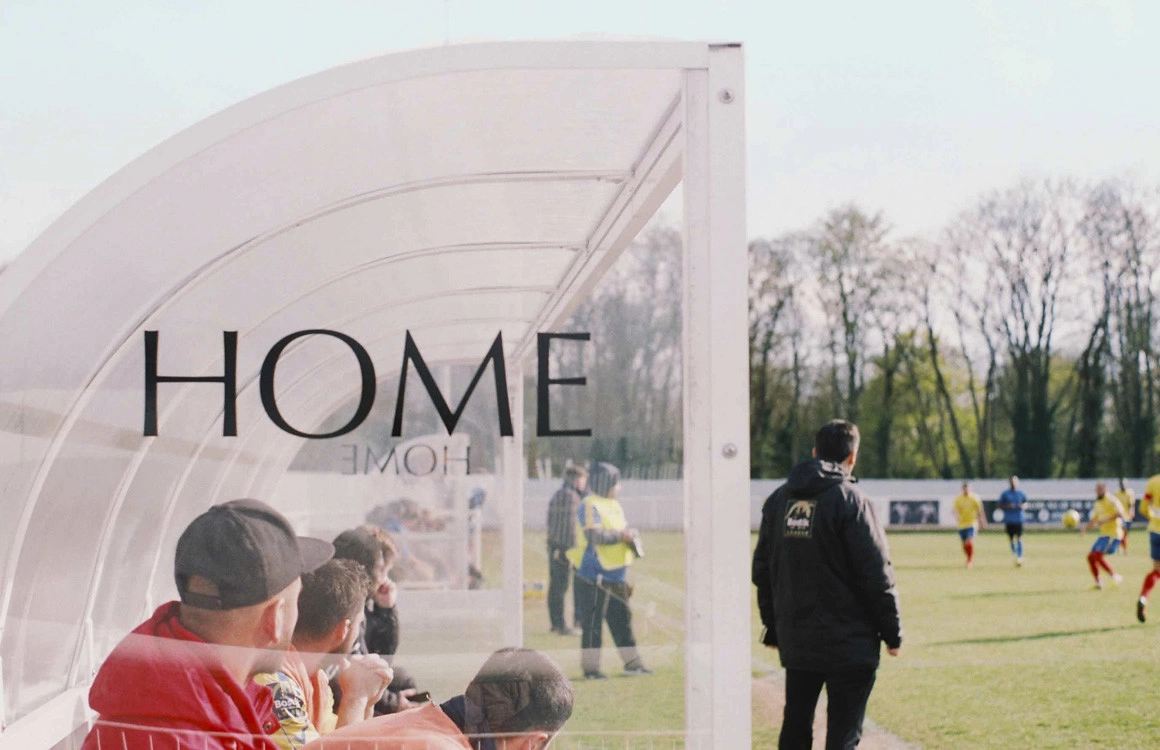
Funding is the hardest part. If other teams from the same league manage to pay their players £300 each per game, FC Romania barely manages to cover a third of that, and only in case of a victory. The boys arrive at the away games in their personal cars, in little groups, but the club tries to reimburse the transport costs. Ionuț points out that he has contacted hundreds of Romanian companies, English ones, Romanian ones operating in England, hoping for a sponsorship contract for the next season, but without much success. The rent of the pitch in Cheshunt alone costs them £10,000 per year. In the past, they have managed to secure sponsors only through close friends and their budget has allowed for the absolute bare necessities.
The hardships haven’t always been related to money for Ionuț, in his 13 years of FC Romania. He has lost friendships with football players when he had to make executive decisions and leave some behind. It hasn’t been easy working away on his laptop throughout the night next to his new-born baby in order to patch up accounts for FC Romania. ‘I have 25 sons and 2 blood daughters’, Ionuț concludes, referring to the boys of FC Romania and his two daughters, of 10 and 2. I ask him whether his wife supports him in his football quest. ‘No’, he replies with a laugh. She doesn’t get in his way either, she simply lets him do whatever he wants.
Liverpool is his team. He admires Gerrard and recounts, wide-eyed, how he got to shake his hand in Liverpool in 2011. As a big Gerrard fan myself, I urge him to expand on this story but he refuses. He wouldn’t want to give the impression that he is bragging, and is simply happy to have met Stevie G. The captain of FC Romania is George Taban - a 30-year-old footballer who used to play at FC Botoșani in the 1st Division in Romania - especially because Ionuț sees in him some of Gerrard’s style and qualities. Ionuț appreciates Jurgen Klopp not solely as a manager but also as a human and presence in football. After Liverpool’s miracle victory against Barcelona in the Champions League semi-final, Ionuț messaged me the following day admitting that he had gone to bed at 3 am. He listened to all the interviews, read all the tweets and rewatched the game. I asked him what he thought about Klopp’s strategy. Ionuț doesn’t think he had one: ‘Klopp just told his players: only you can do this’.
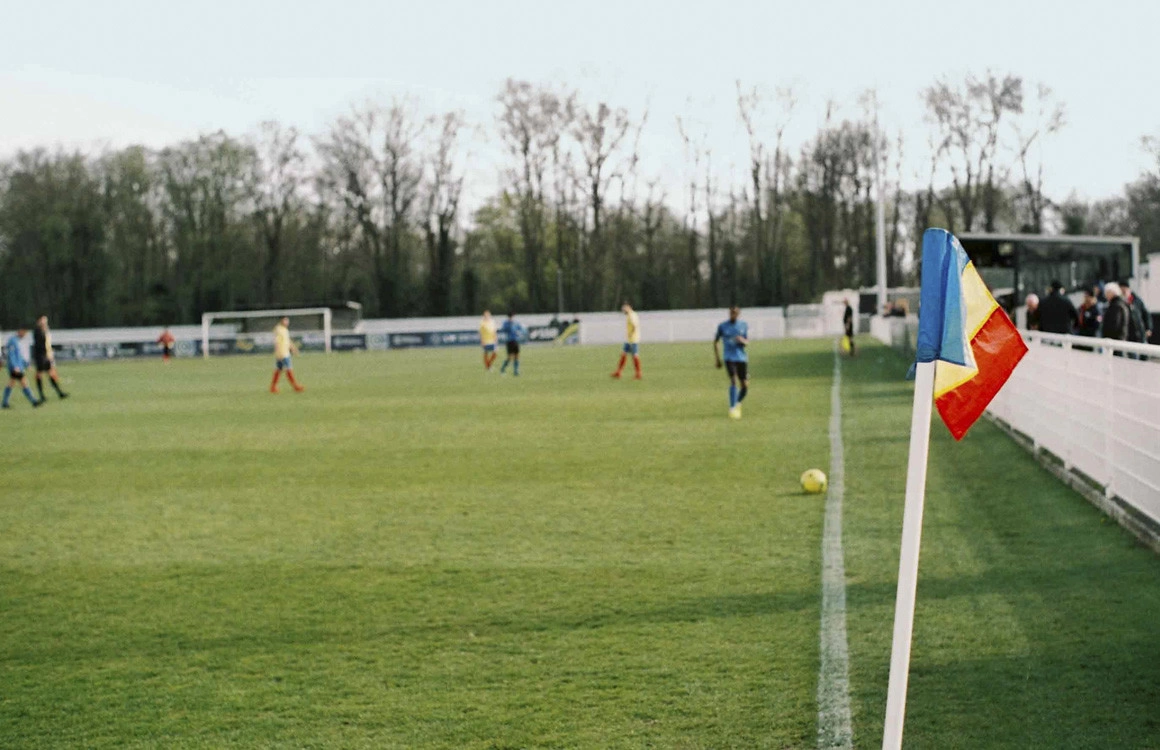
FC Romania’s team includes a few foreigners, in the past Bulgarian player and now several British footballers. Roddy Lemba, the Black British player John Adams hugged after their victory against FC Hertford is 30 and tells me he has joined the team not necessarily because he has anything to do with Romania as a country but because he had played against FC Romania and liked the style of their game. Now he is just happy to spend as much time as possible playing football in a team. The foreigners have integrated well. They’ve learned how to say ‘hello’ in Romanian, ‘pass it’, and some other phrases they are too embarrassed to disclose to me.
I share a bottle of Romanian Cotnari wine with Barbara Saunders, a British woman in her sixties, whom I met at the game. Together with her husband, John Saunders, Barbara is an important member of FC Romania’s board. Their role is to welcome referees and guests when FC Romania play their home games. Outside football, Barbara and her husband work for Moreton Romanian Orphans Fund, an NGO in London, which, for the past 30 years, has brought orphan children from Romania on a two week trip to the UK. The association raises funds for the trip through a variety of events held in England, such as quiz or comedy nights. The children who get to come to England are selected by the local social services in Romania on a scholarly merit basis. Moreton Fund places the children at host families in England and plans various trips and cultural activities throughout their stay. In 2014, Barbara and her husband collaborated with Ionuț and brought 8 children from Vălenii de Munte, Prahova, and from Vrancea to an FC Romania game. That is how they met Ionuț. From then on, there has been a strong bond between them, with Ionuț now calling them ‘mami’ (mom) and ‘tati’ (dad).
Barbara and her husband have been to Romania countless times, visiting orphanages in Prahova and Vrancea. We speak in English, but Barbara is able to converse in Romanian too, gently rolling her ‘r’s in an undulating British accent. She complains about her fellow Brits who are reluctant to learn other languages. Barbara picked up Romanian during her trips to the country, driving through rural areas where speaking English was no longer an option, but also thanks to her adopted daughters. Barbara and John did not have any children of their own and adopted two girls from Romania. Now, their daughters are adults with their own families and homes in England. They see themselves staying in the UK, as they don’t have anyone left in Romania and little reason to go back.
Barbara fills my wine glass as she asks me whether I am worried about Brexit. I answer that I do not worry about myself, as I’ve never wanted to settle in the UK, but that I am concerned about the insular direction we are taking as societies. I then ask her what her views are on the current situation in Britain. She explains that she voted for Brexit because she wants the European Union to be less involved in the UK's decision-making process, and also because EU funds often end up in wrong pockets in corrupt countries. She is aware we are dealing with such issues in Romania, too. Ionuț intervenes, claiming that he’s got little to do with Brexit. From 2017, he and his family have double citizenship (Romanian and British), ‘if it gets to that’, he adds.
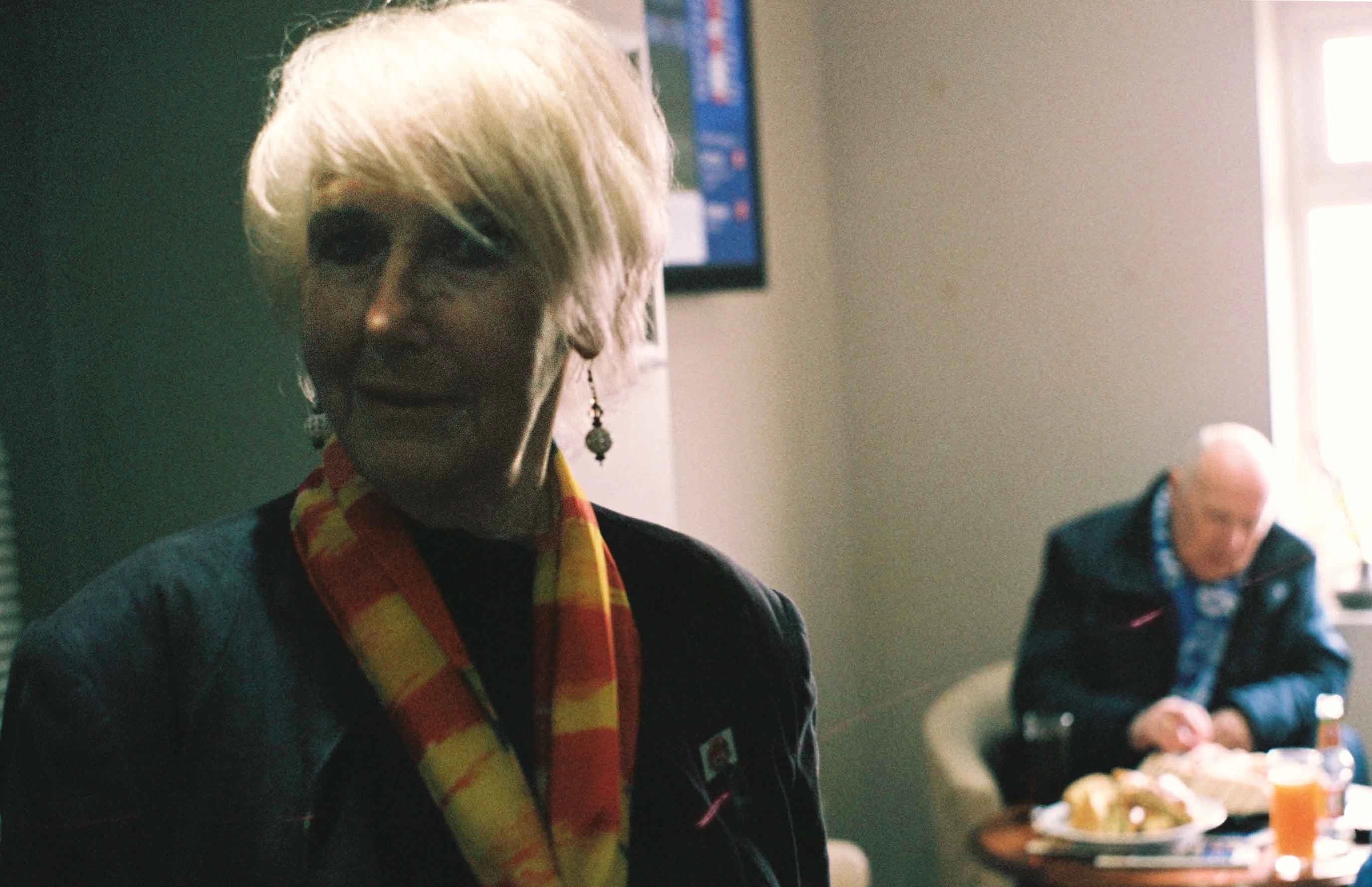
Dan Constantin, a man in his thirties and supporter of FC Romania, offers to give me a ride home. The journey is long and we get the chance to talk about our shared love of Romanian sour cherry liqueur ‘vișinată’, poetry and the football atmosphere in Liverpool, where he watched the Champions League final last year, with Ionuț. They didn’t get stadium tickets but watched it at the pub, where the Liverpool spirit made him fall for the team and its supporters. Dan is a driver, but studies business at the weekend and comes to the FC Romania games straight from his classes. When he is out on long-distance drives, Dan listens to Romanian history vlogs about Vlad the Impaler and Stefan the Great, paying attention to the less flattering details that we weren’t taught in school. Sometimes he listens to Romanian poems, especially by Labiș or Eminescu. He tells me the story of a Brit at his job who made an insulting remark about the Roma, which made Dan reveal that he is ‘Gypsy’ too. The Brits wouldn’t believe it, he adds with a laugh. Dan would like to one day return to his home country because he misses the neighborhood atmosphere and chewing on sunflower seeds. This makes me laugh and I tell him I understand. He is from Târgoviște, just like Ionuț and stresses that Ionuț has always dedicated himself, body and soul, to the team.
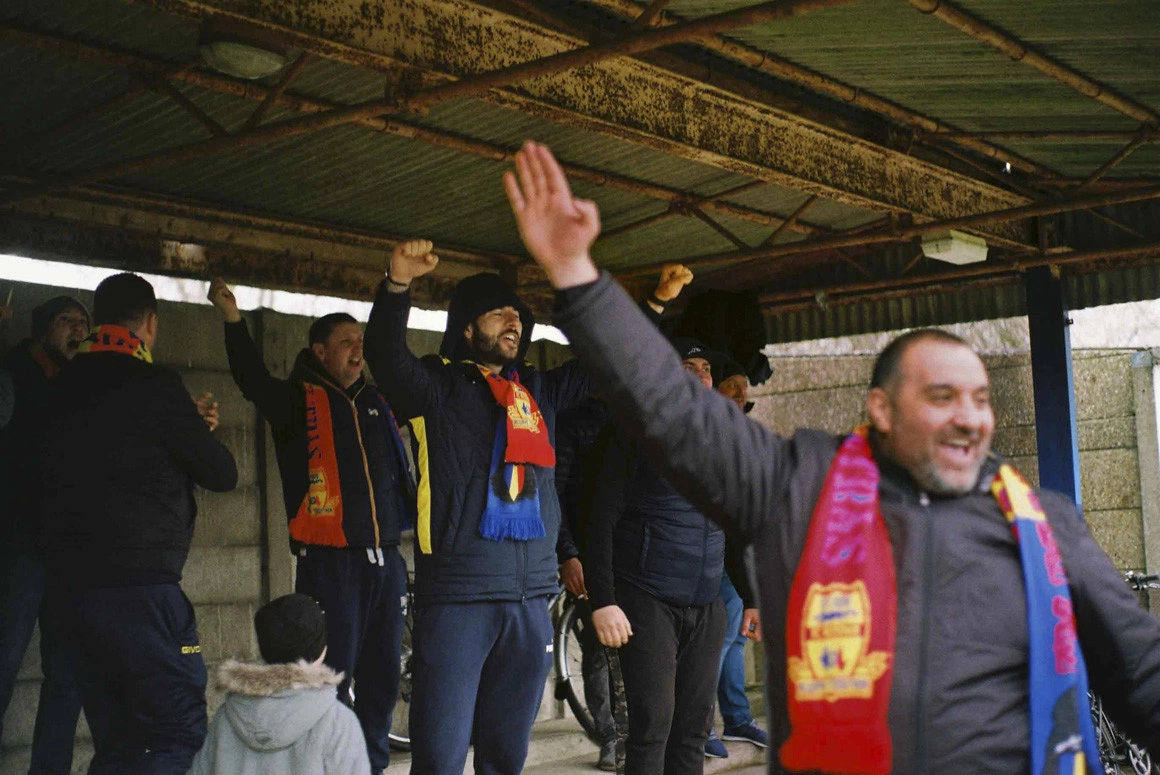
***
The following week, I get to the game late. FC Romania is playing at home, on the pitch they are sharing with FC Cheshunt, and are now losing by two goals scored from penalties by FC Marlow, as Barbara updates me. John Adams is caught up in the games’ whirlwind and makes sporadic microphone announcements. Visibly concerned, John is monosyllabic because of the score. However, the FC Romania boys later share with me that the atmosphere at their home games is notoriously animated by John’s microphone remarks. One footballer - either by sportsmanship or camaraderie, I never find out who - had not scored in four years (and didn’t always show up for the games), but this season he managed to score twice. Ironically, John Adams dubbed him ‘the goal machine’. In the general confusion and because some of the Romanian football players haven't fully mastered the English language, the footballer got the nickname ‘the washing machine’. The Chinese whisper got to John who sometimes still addresses the incident during the games: ‘Washing machine, give us a wave!’.
At the end of the match, Barbara takes me on a pitch tour and shows me around the private room they use after the games. I help her set up the sandwiches she has prepared for the players. The Romanian FC supporters blame the loss on the referees. Ionuț Vintilă clarifies that he encourages his players to avoid offering reasons to be penalized because the Romanians will definitely be punished. The players, on the other hand, mock the supporters who are complaining about the referees and agree with the penalty decisions.
I chat with Cristi Iacob, the leftwing defender. At 25, Cristi looks young but also gives the impression of being mature. He is polite, considerate and has a subtle but sharp sense of humor. In Romania he played for the junior, then the senior team of FC Brașov. He remembers how tough it was to survive on a footballer’s salary in Romania. At 18, he moved to London and worked whatever he could. It wasn’t easy because football players are not used to working, he jokes. He had a child early in life, at 21, which meant more work and less football. Now, he feels grateful that his entire immediate family lives in the UK. At one point, he would like to return to Romania, where he feels home is. He would like more Romanian supporters to show up at the games; not only beer enthusiasts but also families and children. It would be a great social event for the Romanian communities in London and more supporters would give the team a boost of morale. Currently, about 20 supporters turn up per game, among which around 5 are British. Me and Cristi conclude that Romanians in London are so focused on work that they forget about the community aspect or have too little time or energy for it.
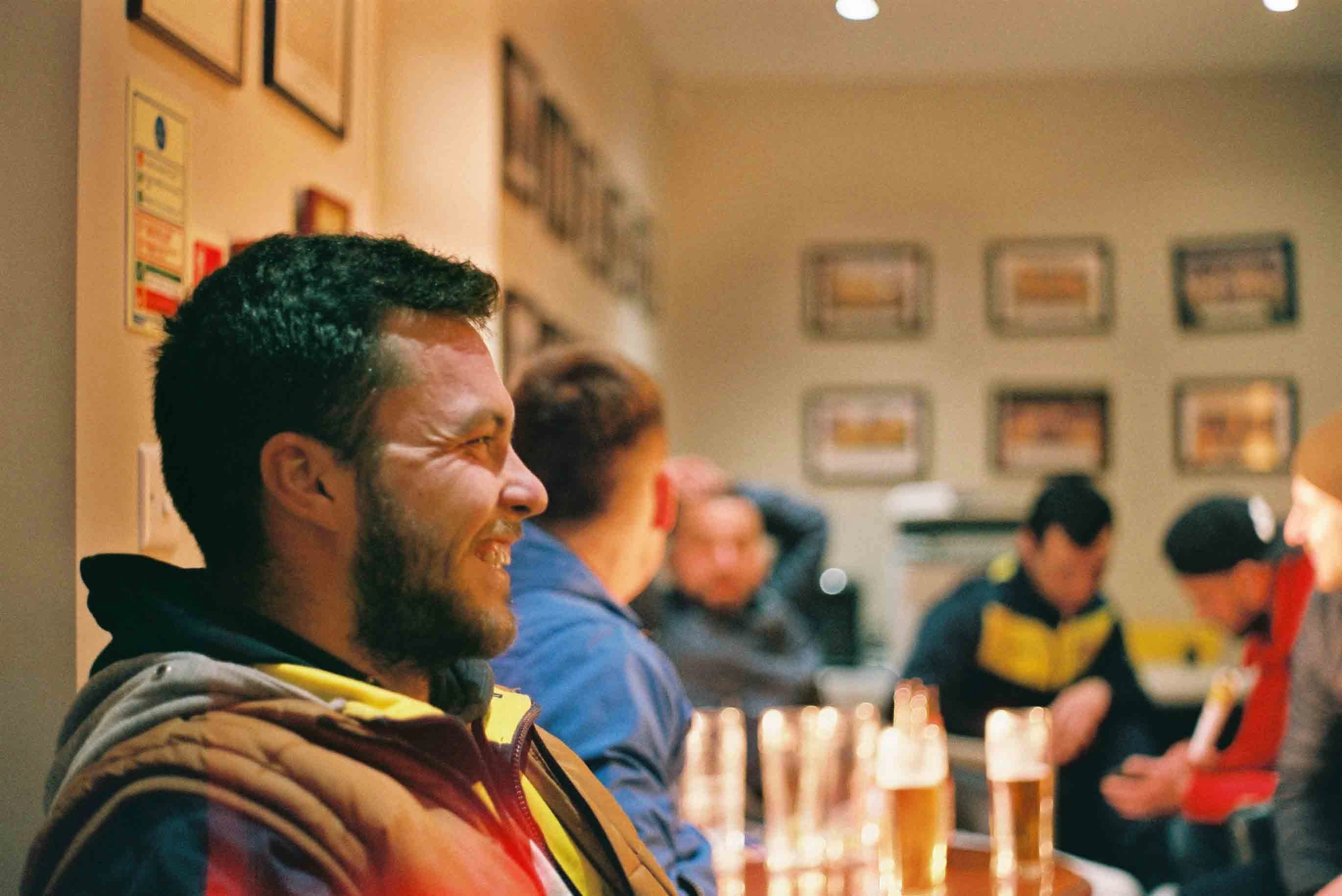
Gabriel Ghinea calls out the boys on their grammatical mistakes. He is 32 and has played at FC Romania for almost 4 years. He is either a defensive midfielder or central defender, depending on the team’s needs. In Romania, he used to play at FC Național and ACS Berceni in league 3 and then 2. Ionuț heard of the financial hardships Berceni was going through in 2015 and offered Gabriel a place in his team, ensuring him a job on a construction site. Gabriel is not sure whether he would still be playing football, had he remained in Romania. He reveals that he’s got many friends who are still playing at home and the situation in football is relatively the same as before, with Champions League expectations but a Division H-like state of affairs. No longer at an age where he believes in idols, he admits that he admires the footballers who play in the Premier League, probably the strongest championship in the world, according to Gabriel, where it is hard to get to and persevere (he mentions Romanian footballers Mutu and Chiricheș). Romania is home for Gabriel Ghinea too and he believes the majority of those who have left would like to one day return, just like him.
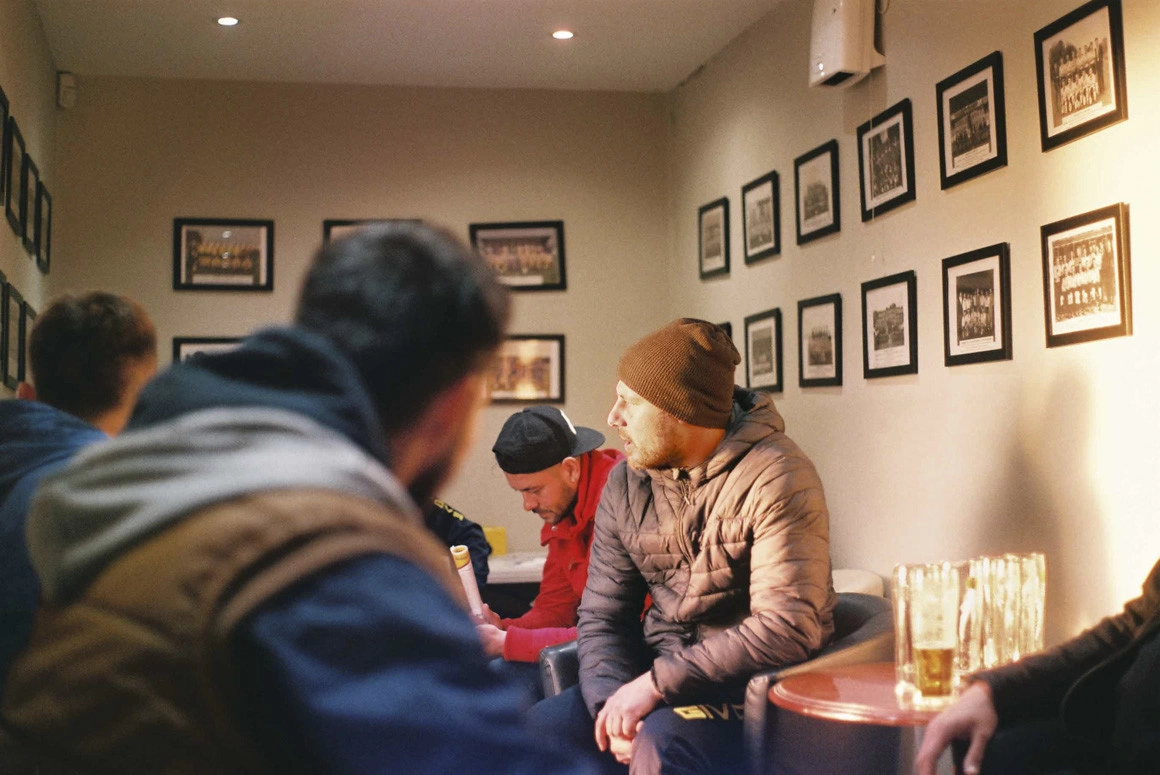
I briefly discuss Brexit with Cristi and Gabriel. The footballers are not necessarily worried, but see Brexit as a phenomenon hard to grapple with, given that the majority of immigrants come to work in the UK and that’s about it. Gabriel believes that the Brits won’t pull the rug out from under themselves by sending immigrants home. By this, he means that Romanians (and immigrants generally) often take on physical labor that those in the host country don’t want to do, such as fruit picking, working on construction sites, or cleaning.
We befriend each other on Facebook and the boys mention John Adams’ proactive presence on the social media platform. Intrigued, I investigate and discover that John posts updates that are overtly pro-Brexit, pro-UKIP, pro-Trump but especially pro-FC Romania. He sometimes films himself sharing encouraging messages for the boys and I find one from exactly before the match against Hertford: ‘This is it, boys”, begins John in his video note, wearing the suit decorated with FC Romania’s logo and the team’s motto, Always Together. After a series of suggestions and comments, John concludes: ‘Give it all ya got, boys, because quite honestly, I luv ya!’. In a comment posted on Cristi’s page, John jots down: ‘You are proud to be Romanian! And rightly so. A nation that has shown the UK the hard work, diligence, determination and drive that are needed to grab the attention of the beneficiaries of such an ambitious people. Proud, of course you are, why wouldn’t you be? I’m proud to know you.’
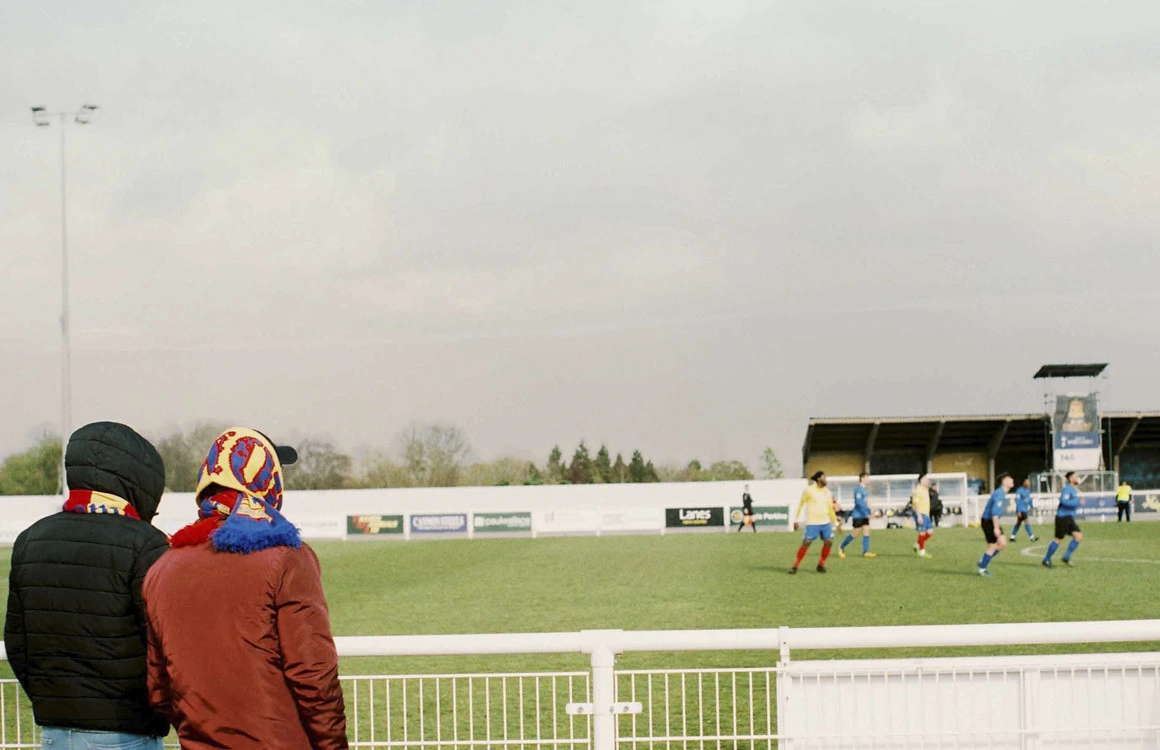
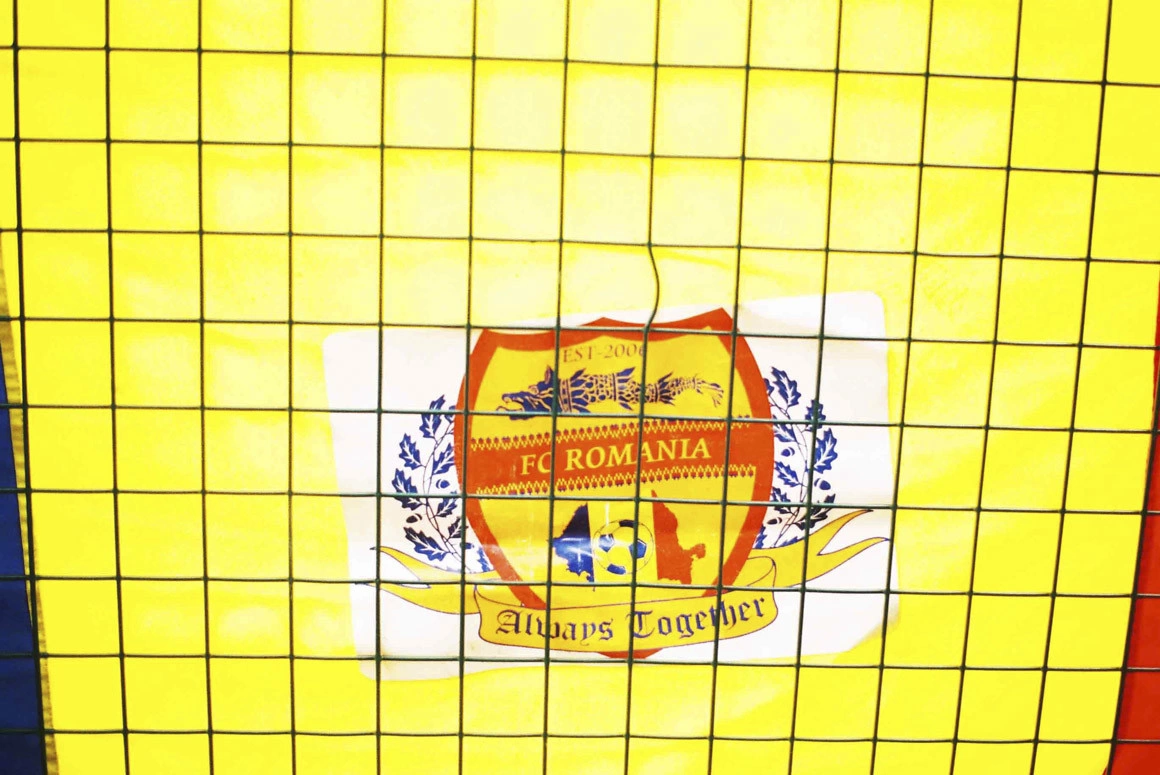
After a couple of pints with the boys in the private room of Theobalds Lane, where FC Romania plays their home games, I ask Ionuț Vintilă why he does what he does: the sacrifices and unpaid work he has done for FC Romania in the past 13 years. ‘I don’t even know why I do it. At the beginning it was because of circumstances, then it was pride… then opportunity’. Last season, they missed being promoted in the 8th league because of a last-minute goal scored in an indirect game played by two other teams that then decided the fate of FC Romania. That’s when he promised himself he’d give up. Shortly afterward, he received a phone call from a hidden number, informing him that a team in the 7th league had dissolved and therefore FC Romania was automatically being promoted to league 8. He couldn’t let go anymore.
After 3 more games in their thirteenth championship played in England, FC Romania manages to maintain their presence in the eighth league. This was their aim and they have achieved it. They even secured some sponsorships, through friends again. Recently, the company that prints the football kits of teams such as Manchester City and Tottenham offered to print FC Romania’s kits for free. Ionuț is not sure why. He got the meeting through a friend and the story of his team seemed to be enough.
This year, FC Romania set up a football academy for children, trained by 3 licensed teachers. So far, all those attending are the children of Romanian immigrants but the academy is open to everyone. The 14 children registered are between 5 and 9 years old and, Ionuț hopes, will one day join the senior team. How could he give up now? FC Romania continues its story alongside the lives of all the immigrants and Brits the team has brought together, every Saturday, for the past 13 years.
This article was originally published in Scena9, in Romanian, on the 2nd of July, 2019
Translated from the Romanian by Oana Țenter
